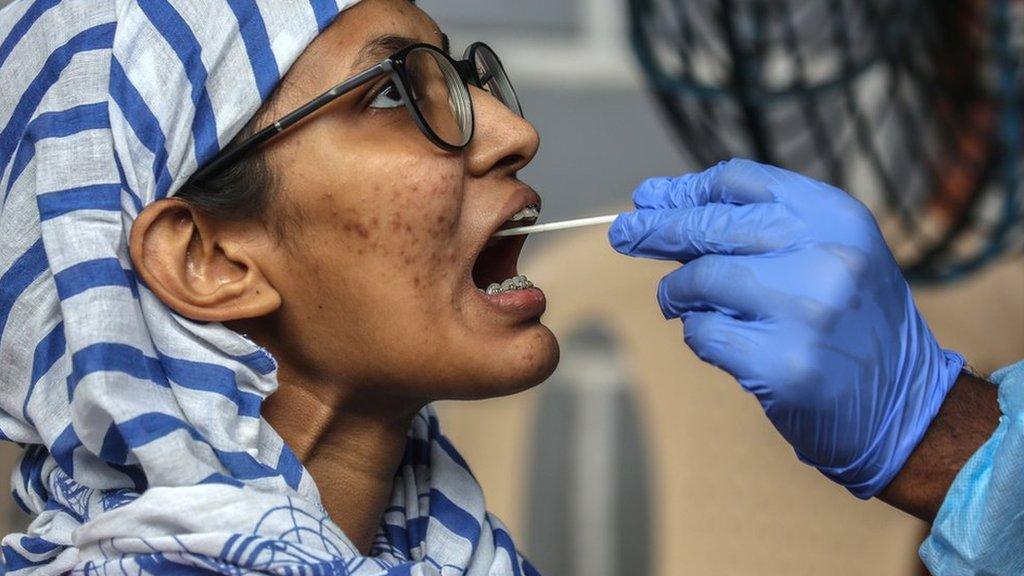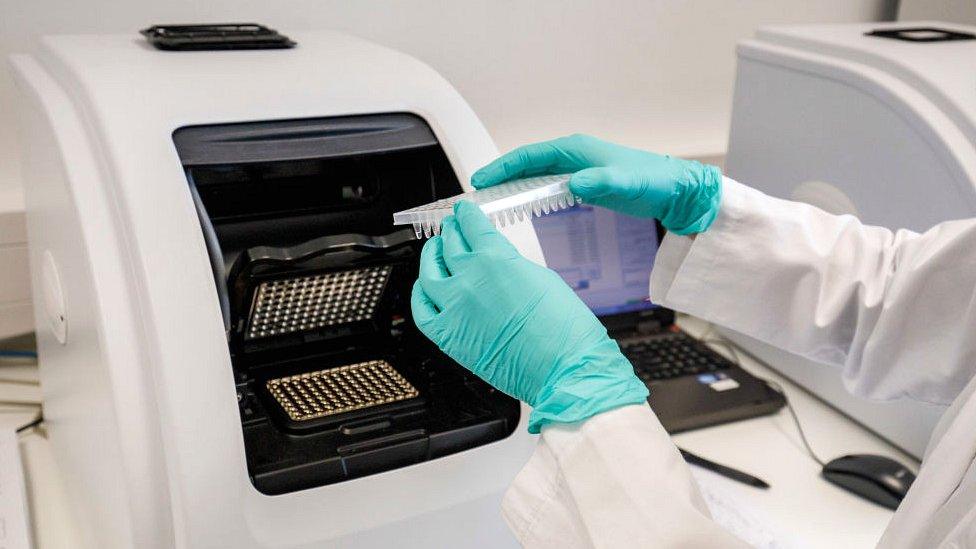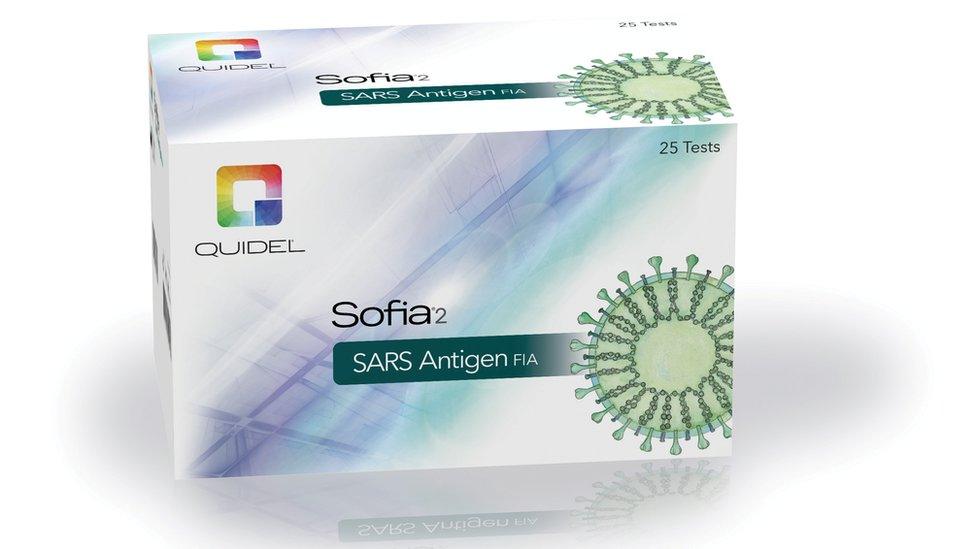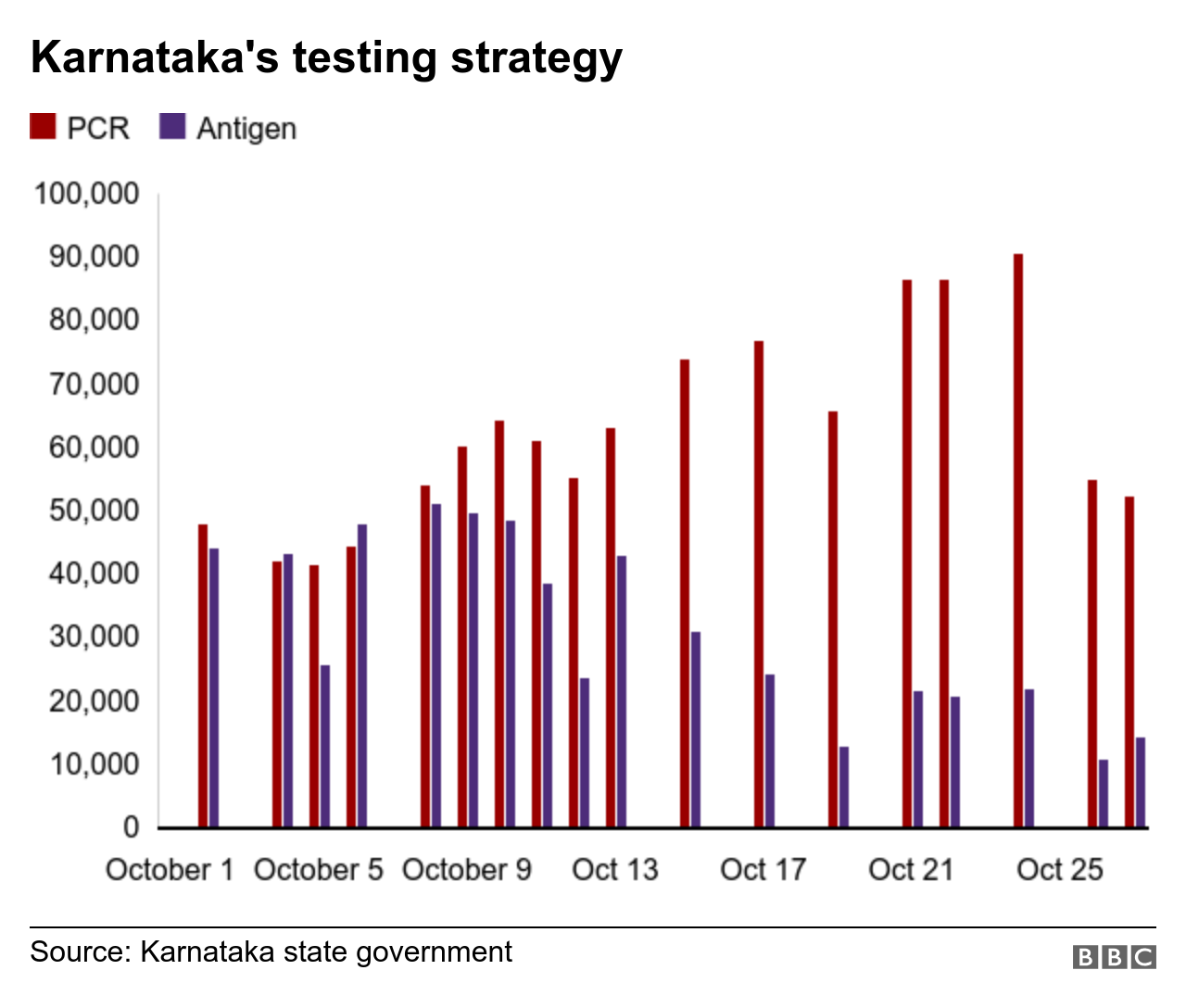Coronavirus: India tries new type of tests to tackle virus
- Published

India has approved the use of a new type of rapid coronavirus test based on gene editing technology in a bid to boost its testing numbers.
With the second highest number of cases in the world after the US, India is trying to increase testing, but there've been issues around the reliability of some types of test.
What kind of tests is India using?
The latest one gives fast results, like a pregnancy test, and is named after a fictional Indian detective character, called Feluda.
It uses a technique known as Crispr - short for Clustered Regularly Interspaced Short Palindromic Repeats - which is a gene editing technology.
Gene editing works in a way similar to word processing, and can scan DNA to make microscopic changes to the genetic code.
It's been used to treat ailments like sickle cell disease.
The Indian health minister says that the new tests will be rolled out in a few weeks.
The one that's been most commonly used globally is a PCR (polymerase chain reaction) test, which isolates genetic material from a swab sample.
It's regarded as the gold standard of testing.

PCR tests go through machine analysis
Chemicals are used to remove proteins and fats from the genetic material, and the sample is put through machine analysis.
But they're the most expensive and take up to eight hours to process the samples. To produce a result may take up to a day, depending on the time taken to transport samples to labs.
Are there issues about accuracy?
In order to increase testing capacity, the Indian authorities have been switching over to a cheaper and quicker method called a rapid antigen test, also known as diagnostic or rapid tests.
These isolate proteins called antigens that are unique to the virus, and can give a result in 15 to 20 minutes.
But these tests are less reliable, with an accuracy rate in some cases as low as 50%, and were originally meant to be used in virus hotspots and healthcare settings only.

Antigen tests produce faster results than PCR tests but are less reliable
India's top medical research body, the Indian Council of Medical Research (ICMR), has approved the use of five antigen tests developed in South Korea, Taiwan, Belgium and two developed locally in India.
But one of these was independently evaluated by the ICMR and the All Indian Institute of Medical Sciences (AIIMS), which found that their accuracy in giving a true negative result ranged between 50% and 84%.
The ICMR issued guidelines saying those with negative results from an antigen test should also get a PCR test if they show symptoms, to rule out a false negative.
Are rapid tests recommended globally?
In the UK, the most common type of rapid test has an error margin of 20% for giving false negative results.
But the rapid test kits developed by Oxford Nanopore are said to pick up 98% of positive cases, although that needs independent checking by researchers and health experts.
Both these rapid tests use genetic material, not antigens, and are more reliable.
The World Health Organization (WHO), external and the US Food and Drugs administration, external have also advised getting a PCR test if you test negative in a rapid antigen test.
Are Indian states missing coronavirus cases?
Delhi was the first state to begin antigen-based testing in June, and many other states followed suit. It began using them on 18 June, although there is no data publicly available until 29 June.

Data from 29 June to 28 July showed that of all tests done in Delhi in that period, 63% were antigen tests.
Between 8 and 15 September, less than a quarter of tests carried out were PCR tests - the rest were done using the antigen test.
However, the testing strategy in Delhi has now changed, with the numbers of the more reliable PCR tests being increased in October.
So 85% of those who tested negative in an antigen test this month - and who still had symptoms - were retested using the PCR method. Earlier, only 10-15% had been retested.
As a result, the proportion of positive tests went up to 8% in the week starting 21 October, against the previous week's figure of 6.2%.
However, a rise in positivity may also mean a need for ramping up testing as the outbreak may be expanding.
The southern state of Karnataka started using antigen tests in July, aiming for 35,000 a day across 30 districts.

In the beginning of August, the state ramped up antigen testing and reduced PCR testing. But it has increased PCR tests again - now 60% of all tests - after concerns about accuracy.
Figures give out at the end of August showed that 17% of those who tested negative in an antigen test got a positive result in a PCR test later on.
In Telangana state, the government also ramped up antigen testing in July.
There are currently only 61 government and private labs equipped to do PCR tests, as against more than a thousand government facilities for antigen tests.
India's worst affected state, Maharashtra, first began antigen tests in Mumbai in July.
The city's municipal corporation reported at the time that 65% of those who had symptoms of Covid-19 tested negative in the antigen test, but went on to be positive in a PCR test.
Dr Anupam Singh, a public health expert, says there are some advantages to the rapid tests: "It allows a faster detection process and means you can quickly detect highly infectious individuals with a high viral load..."
But he also has concerns about relaying on these rapid tests, which can potentially miss many infections.

